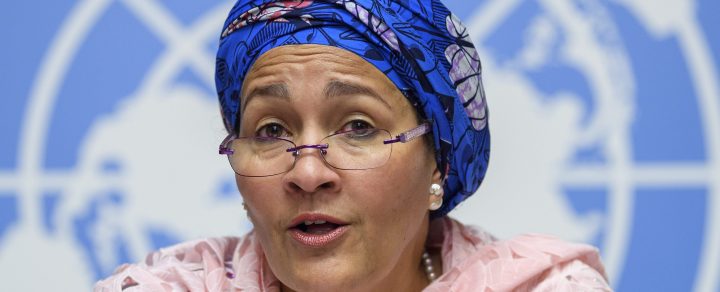NAIROBI CLEAN-UP
Young people commit to rebuilding Kenya’s polluted waterways, one river at a time

The Deputy Secretary-General of the United Nations, Amina Mohammed, has visited a school in Kenya to encourage young people to nurture the environment that is their future.
‘Thank you for turning waste into wealth,” said UN Deputy Secretary-General Amina Mohammed to a group of schoolchildren and members of the local Rotary Club. As part of the Adopt A River Initiative, the learners have chosen the Kirichwa River in the Nairobi suburb of Lavington. So far, they have removed 200 tonnes of waste — mostly plastic — along 15km of river.
Adopt A River is a pilot programme by Kenya’s National Environment Management Authority, implemented by the Green Miles Coalition (local Rotary and Rotaract clubs) and supported by the United Nations Environment Programme. The joint venture seeks to encourage “people-driven” monitoring and restoration of wetlands that are within the Nairobi River Basin.
The programme includes communities along the river, local leaders, schools and institutions in the region, encouraging them to look after their surrounding environment. Since starting the programme about a year ago, the young volunteers from Kawangware Primary School are now concentrating their efforts further upstream the Kirichwa River.
Mohammed’s visit came during the resumed fifth session of the United Nations Environment Assembly that’s taking place online and in Nairobi. The meeting seeks to create the first legally binding treaty on plastic pollution.
Mohammed’s “green education” programme included speaking to young activists, planting a tree, visiting the school garden and waste depot and inspecting a homemade irrigation system consisting of recycled plastic bottles turned upside down in the soil.
“Today I saw your river was calling you, and you adopted a river,” the UN official told children gathered in a tent.
“Thank you for doing what you do here and turning waste into wealth. Today I saw not only a commitment to your community and environment, but I also saw your respect for people like Wangari Maathai who is a hero for all of us in Africa. I can see many Wangari Maathai’s here,” she said, referring to Kenyan conservationist and the first African woman to win a Nobel Peace Prize.
If the poor state of the Kirichwa River is anything to go by, all forms of intervention are necessary if many of Kenya’s polluted waterways are to be saved.
“You think you have started a small project, but we are getting inquiries from all over the world — they want to learn from us,” said Geeta Manek, District Governor Elect of Rotary International, to the schoolchildren.
“People across the world… are asking what are you doing? How are you able to get 200 tonnes of waste out [of the rivers]? And they’ve got all these fancy machines out in the oceans and we’re doing it with our hands.”
The Kirichwa River, which you can smell before you see it, runs through informal settlements and is threatened by a lack of sanitation infrastructure, household waste, sewage discharge, industrial dumping and a lack of pollution control policies, much like the rest of Kenya’s waterways.
Some of the river’s surrounding communities have poor water and sanitation infrastructure, a situation made worse by industries dumping untreated waste into the water. Mobilising members of the nearby slums can be a great way to reduce river pollution and encourage better care of environments by those communities.
“This is really a very humble project. Adopt A River has been created in a very informal settlement, but it has created a huge buzz around the world, in over 35,000 communities from Nairobi to Nepal, from Accra to Adelaide — Rotary members are really keen on learning from us and are astounded by the work that we’ve done,” Manek said. DM/OBP
Daily Maverick’s presence at the UNEA meetings in Nairobi, Kenya, is made possible by the support of the United Nations Environment Programme.

















 Become an Insider
Become an Insider
We should adopt this same attitude, not only school kids, but adults, private sector and goverment(when we get one that cares about south africans)